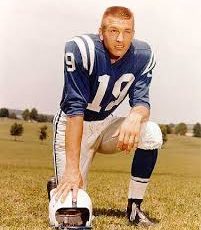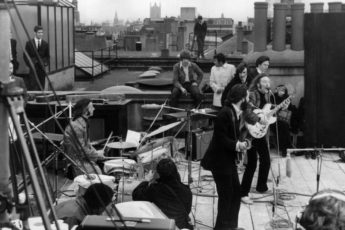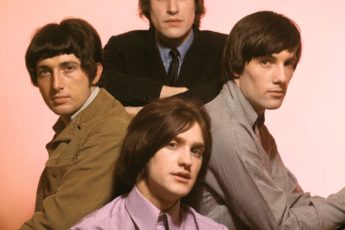
I’ve always considered it one of my favorite retorts, from a rock artist or pretty much anyone else. It was 2000, and one of the most legendary rock bands ever, AC/DC, was releasing their newest album, Stiff Upper Lip. An intrepid reporter was interviewing the band on a promotional stop, and after fawning over them for nearly all of the session eventually did his journalistic duty to introduce a tough subject. Reflecting on the long-time signature AC/DC sound, he asked “What do you say to those people,” he began with some hesitancy, “who suggest you’re just putting out the same album over and over, that you’ve had 11 albums that all sound about the same?” Angus Young, the band’s guitarist, co-founder, and schoolboy icon, shot back. “I’m sick to death of people saying we’ve made eleven albums that sound exactly the same,” he exclaimed in mock outrage. “The fact is, we’ve made twelve albums that sound exactly the same!”
Then, in an “if-it-ain’t-broke-don’t-fix-it” explanation, Young elaborated. “You spend all your time as a band getting your own style,” he continued. “I’m constantly surprised when people say ‘But you haven’t changed!’ It’s like saying ‘You’ve got a wheel. Now why don’t you make it a square?”
I have to say, that statement makes a lot of sense to me. McDonalds isn’t changing their secret sauce, and this balls-out rock & roll locomotive formed in Sydney, Australia in 1973 by Scottish-born brothers Malcolm and Angus Young, has never wavered from theirs either. Only with AC/DC the formula is really little secret. It starts with a pummeling, chest-rattling rhythm section, layers on corrosive, screeching yet somehow melodious vocals, often featuring over-the-top bawdy lyrics, and is highlighted by a relentless cyclone of guitars, Malcolm’s churning rhythm always the driving force of every number, and Angus’s manic mutation of Chuck Berry and Motörhead providing incomparable six-string pyrotechnics.
And so, 44 years on from their initial release, and exactly four decades since creating one of the best-selling albums in music history, the 25x Platinum (over 50 million copies) genre-defining behemoth, Back In Black, AC/DC is, well, back again. This time with their just-announced, forthcoming 2020 release Power Up completing one of the more improbable resurrections imaginable. In October, 2017, Angus and Malcolm’s older brother George, guitarist in famed Australian band The Easybeats (‘Friday On My Mind’) and producer of seven AC/DC records, died. Just three weeks later, following a protracted battle with dementia, Malcolm, the band’s unequivocal backbone, was gone, too. But in a move reminiscent of Clarence Clemons begetting nephew Jake Clemons in the E Street Band, Malcolm’s nephew Stevie, son of Stephen, Sr., the eldest of the five Young brothers, has since subbed in for him. Even more complicated were the returns of the remaining three long-term members. Burned-out by the road and suffering from debilitating vertigo, bassist Cliff Williams had called it quits in 2016. Some two years prior, drummer Phil Rudd had bizarrely been pulled out of the band following his arrest by New Zealand authorities for “attempting to procure a murder” (charges which were ultimately withdrawn). And lead singer, Brian Johnson, who’d somehow arrived in 1980 to be the absolute perfect successor for the irreplaceable Bon Scott as the band’s howling vocalist all the way back with the Back In Black album, had been forced to step away in 2016 mid-tour1 amid the onset of severe and thought-to-be permanent hearing loss (as likely advanced by the withering sounds emanating from his own vocal monitor as much as from any wall of amps also sharing the stage).
But appropriately, the aftermath of reconvening at Malcolm’s funeral in Australia soon paved the way to reconciling the fractured band: Williams recovering sufficiently to agree to give it one more go; Rudd serving out his period of punitive home confinement; and culminating with Johnson’s still-unexplained miracle deafness cure. Undergoing experimental treatments from a mysterious aural specialist once a month for two-and-a-half years, Johnson sat wired-up to a machine that resembled a car battery, about which he only described “It uses the bone structure in the skull as a receiver. That’s as much as I can tell you.” Angus, of course, was the lone constant. Well, Angus and big brother Malcolm, even from the grave, who provided not only the inspiration but, as it turned out, the material for the new record. When Angus had returned to Australia he took a long break and began poring through an extensive backlog of unfinished and unreleased songs written over the years with Malcolm. “If I do anything in my life,” Angus said then, “I have to get these tracks down and get these tracks out.” Every song on the resultant album Power Up is credited not simply to Angus but also to Malcolm Young. “This record is pretty much a dedication to my brother Malcolm. It’s a tribute to him like Back In Black was a tribute to Bon Scott.”
The first time I heard Back In Black was at the Kappa Sig house at Hobart College, where my friend Zuck and I were visiting our buddies Rosey and Kap. It was barely daybreak, and it was following an extremely long night of consuming a great deal of malty beverages at a brilliantly themed outing called Mug Night.2 One of their housemates, a hard-to-forget character named Curly, was climbing up the side of the house to a roof deck, just outside the window where I was sleeping, having cruelly pierced our already-throbbing heads with the cacophonous sound of the epic opening track, ‘Hells Bells.’ Oh, did I mention that Curly was inexplicably butt naked? Sorry to bury the lede. It’s a thoroughly disturbing image I’ve long tried to erase from my mental catalog, but a musical memory I’m so glad I never could. I can’t hear this song, for 40 years now and counting, and not be immediately taken back to the moment of painfully meeting the new day with Curly, au naturel, absolutely blaring this Herculean, house-shaking classic. When I eventually get the chance to listen to AC/DC’s imminent new album, which will be their 16th (release date: November 13th), I expect it to sound just like that: simplistic, monotonous, formulaic, rough, raw, and devastatingly effective. By now it should be nakedly obvious that the righteous rock and roll regimen of Angus Young would permit nothing less.
1To finish out the remaining slate of 23 scheduled shows the band employed a guest vocalist by the name of Axl Rose.
2Staged by a local bar, The Oaks, the hook was that they’d fill any sized mug for the same price. Fifty cents. And my pals had warehoused a crop of obscenely enormous steins.






Leave a Comment